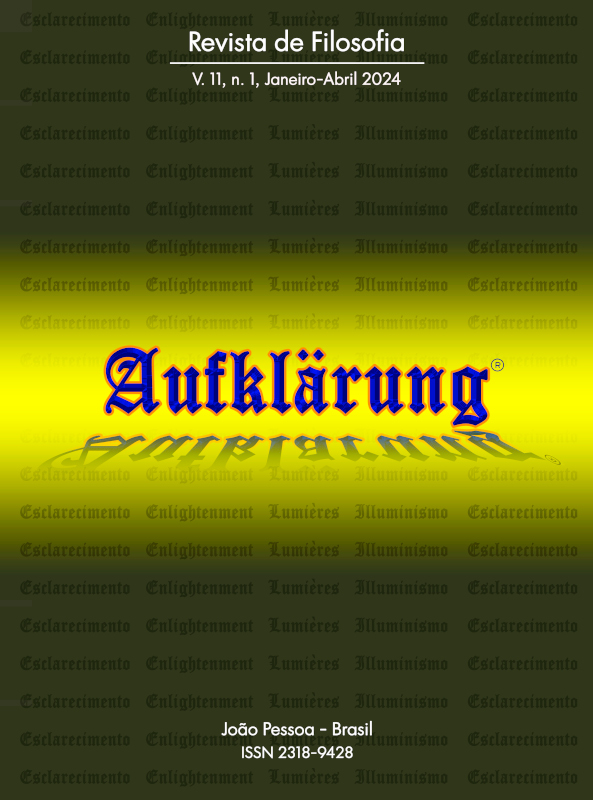The recondites of modernity: history and utopia in Kant and Adorno
DOI:
https://doi.org/10.18012/arf.v11i1.68029Keywords:
Dialectics, Enlightenment, Utopia, NegativityAbstract
This paper aims to elucidate the meanings of the concept of modernity, highlighting its contradictory core and the theoretical and practical implications of this contradiction. To this end, we turn to the works of the German philosopher Immanuel Kant (1724-1804), as a paradigmatic intellectual expression of modernity, insofar as the author highlights notions that seem central to understanding the specificity of his time, which are brought together in his reflections on history and human progress, in the context of the enlightenment that is struggling to become effective. We believe it is possible to extract from these reflections an idea of utopia which, although it needs to be cleansed of certain idealistic excesses, ends up representing a perspective that dialogues with Critical Theory, notably with Theodor Adorno (1903-1969). Although he demonstrates the bankruptcy and limits of the philosophical categories that authors such as Kant used to think about modernity, he doesn't discard the concepts in question, but rather puts them under tension, ultimately aiming to unveil the prospects for emancipation from the administered world, which, in the final analysis, have always been present at the heart of modern thought.
Downloads
References
ADORNO, Theodor W. Introdução à dialética. Tradução de Erick Calheiros de Lima. São Paulo: Unesp, 2022.
ADORNO, Theodor W. Mínima Moralia. Tradução de Paulo César de Souza. São Paulo: Ática, 1992.
ADORNO, Theodor W. Palavras e sinais: modelos críticos 2. Tradução de Maria Helena Ruschel. Petrópolis, RJ: Vozes, 1995.
ADORNO, Theodor W.; BLOCH, Ernst. Qualcosa manca… Sulle contraddizioni dell’anelito utopico. In: BLOCH, Ernst (Org.). Speranza e utopia. Tradução de Eliano Zigiotto. Milano: Mimesis, 2022, pp. 56-74.
ADORNO, Theodor W.; HORKHEIMER, Max. Dialética do esclarecimento: fragmentos filosóficos. Tradução de Guido Antonio de Almeida. Rio de Janeiro: Jorge Zahar Ed., 1985.
BAUDELAIRE, Charles. O pintor da vida moderna. In: COELHO, Teixeira (Org.). A modernidade de Baudelaire. Tradução de Suely Cassal. Rio de Janeiro: Paz e Terra, 1988, pp. 159-212.
BENJAMIN, Walter. Rua de mão única. Tradução de Rubens R. T. Filho e José Carlos M. Barbosa. São Paulo: Brasiliense, 1987.
BLOCH, Ernst. O princípio esperança: volume 1. Tradução de Nélio Schneider. Rio de Janeiro: EdUERJ; Contraponto, 2005.
BLOCH, Ernst. Speranza e utopia: conversazioni 1964-1975. Tradução de Eliano Zigiotto. Milano: Mimesis, 2022.
DESCARTES, René. Discurso do método. Tradução de Paulo Neves. Porto Alegre: L&PM, 2015.
FOUCAULT, Michel. O governo de si e dos outros: curso no Collège de France (1982 – 1983). Tradução de Eduardo Brandão. São Paulo: WMF Martins Fontes, 2010.
HEGEL, Georg Wilhelm Friedrich. A Razão na História: Introdução à Filosofia da História Universal [1822;1830]. Tradução de Artur Morão. Lisboa: Edições 70, 1995.
HEGEL, Georg Wilhelm Friedrich. Princípios da Filosofia do Direito. Tradução de Orlando Vitorino. São Paulo: Martins Fontes, 1997.
KANT, Immanuel. À paz perpétua: Um projeto filosófico. Tradução de Bruno Cunha. Petrópolis, RJ: Vozes, 2020.
KANT, Immanuel. Crítica da Razão Pura. Tradução de Fernando Costa Mattos. 4. ed. Petrópolis, RJ: Vozes, 2015.
KANT, Immanuel. Crítica da Razão Prática. Tradução de Monique Hulshof. Petrópolis, RJ: Vozes, 2016.
KANT, Immanuel. Conjectures sur les débuts de l’histoire humaine. In: PIOBETTA, Stéphane (Org.). Kant: la philosophie de l’histoire. Tradução de Stéphane Piobetta. Paris: Éditions Montaigne, 1947a, pp. 26-45.
KANT, Immanuel. Essai pour introduire en philosophie le concept de grandeur négative. 2. ed. Tradução de R. Kempf. Paris: Librarie Philosophique J. Vrin, 1991.
KANT, Immanuel. Ideia de uma História Universal de um ponto de vista cosmopolita. 3. ed. Tradução de Ricardo Ribeiro Terra. São Paulo: WMF Martins Fontes, 2011.
KANT, Immanuel. Le conflit des Facultés. In: PIOBETTA, Stéphane (Org.). Kant: la philosophie de l’histoire. Tradução de Stéphane Piobetta. Paris: Éditions Montaigne, 1947b, pp. 163-179.
KANT, Immanuel. Réponse à la question: qu’est-ce que “les lumières”?. In: PIOBETTA, Stéphane (Org.). Kant: la philosophie de l’histoire. Tradução de Stéphane Piobetta. Paris: Éditions Montaigne, 1947c, pp. 26-45.
LUKÁCS, Georg. História e Consciência de classe: estudos sobre a dialética marxista. Tradução de Rodnei Nascimento. São Paulo: Martins Fontes, 2003.
LUKÁCS, György. Para uma ontologia do ser social I. Tradução de Carlos Nelson Coutinho. São Paulo: Boitempo, 2012.
MARX, Karl; ENGELS, Friedrich. Manifesto Comunista. Tradução de Álvaro Pina e Ivana Jinkings. São Paulo: Boitempo, 2010.
MARX, Karl. O Capital: crítica da economia política; Livro I: o processo de produção do capital. Tradução de Rubens Enderle. São Paulo: Boitempo, 2013.
Additional Files
Published
How to Cite
Issue
Section
License

This work is licensed under a Creative Commons Attribution 4.0 International License.
Journal general policy
1.This journal works under a Creative Commons License aplied to online journals. That icence can be read in the following link: Creative Commons Attribution 4.0 International (CC BY 4.0).
2.Accordingly to this License, a)the journal declares that authors hold the copyright of their articles without restrictions, and they can archieve them as post-print elsewhere. b)the journal allow the author(s) to retain publishing rights without restrictions.
Metadata Policy for information describing items in the repository
1. Anyone may access the metadata free of charge at anytime.
2.The metadata may be re-used in any medium without prior permission, even commercial purposes provided the OAI Identifier or a link to the original metadata record are given, under the terms of a CC BY license refered for the Journal.







































